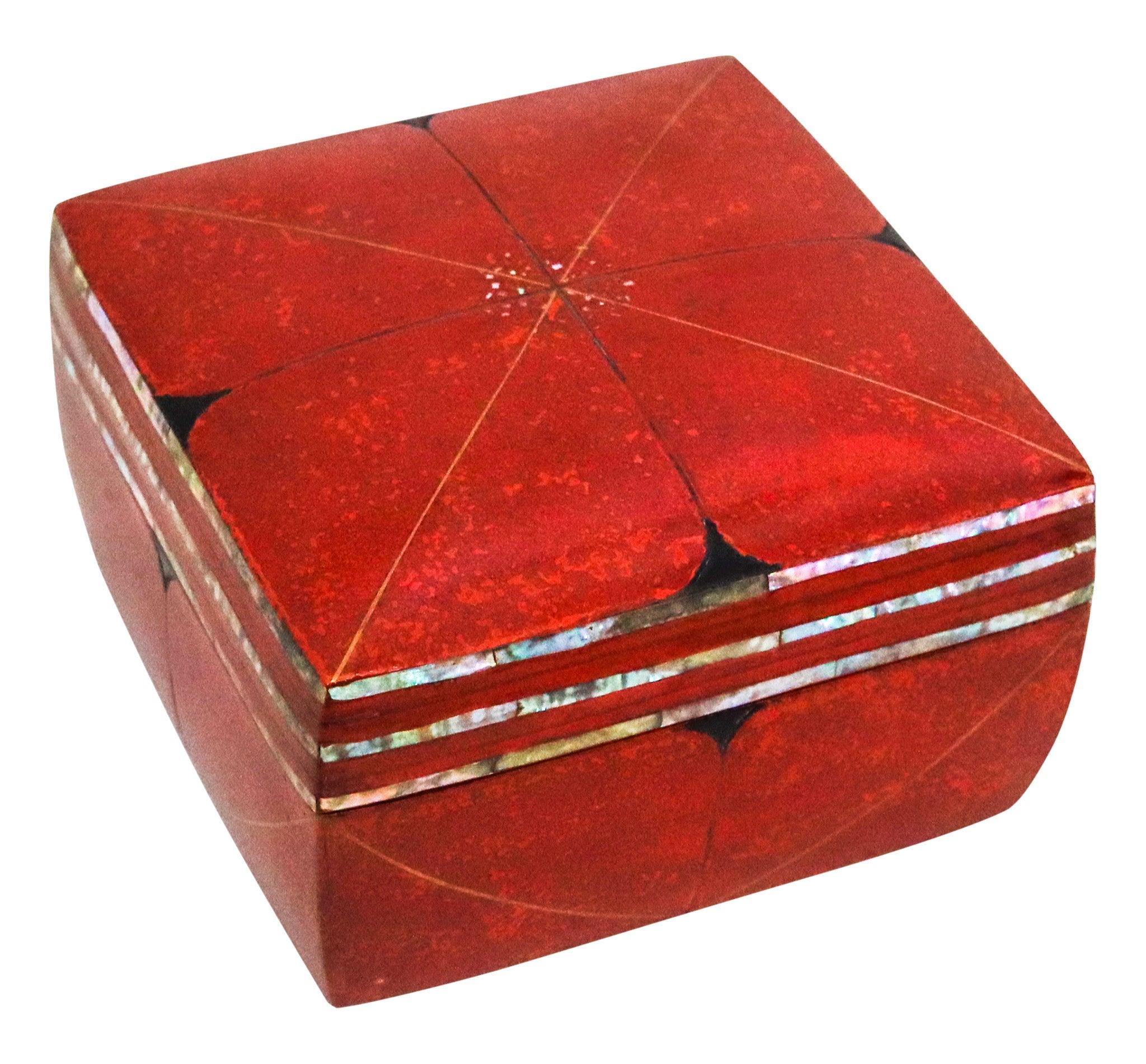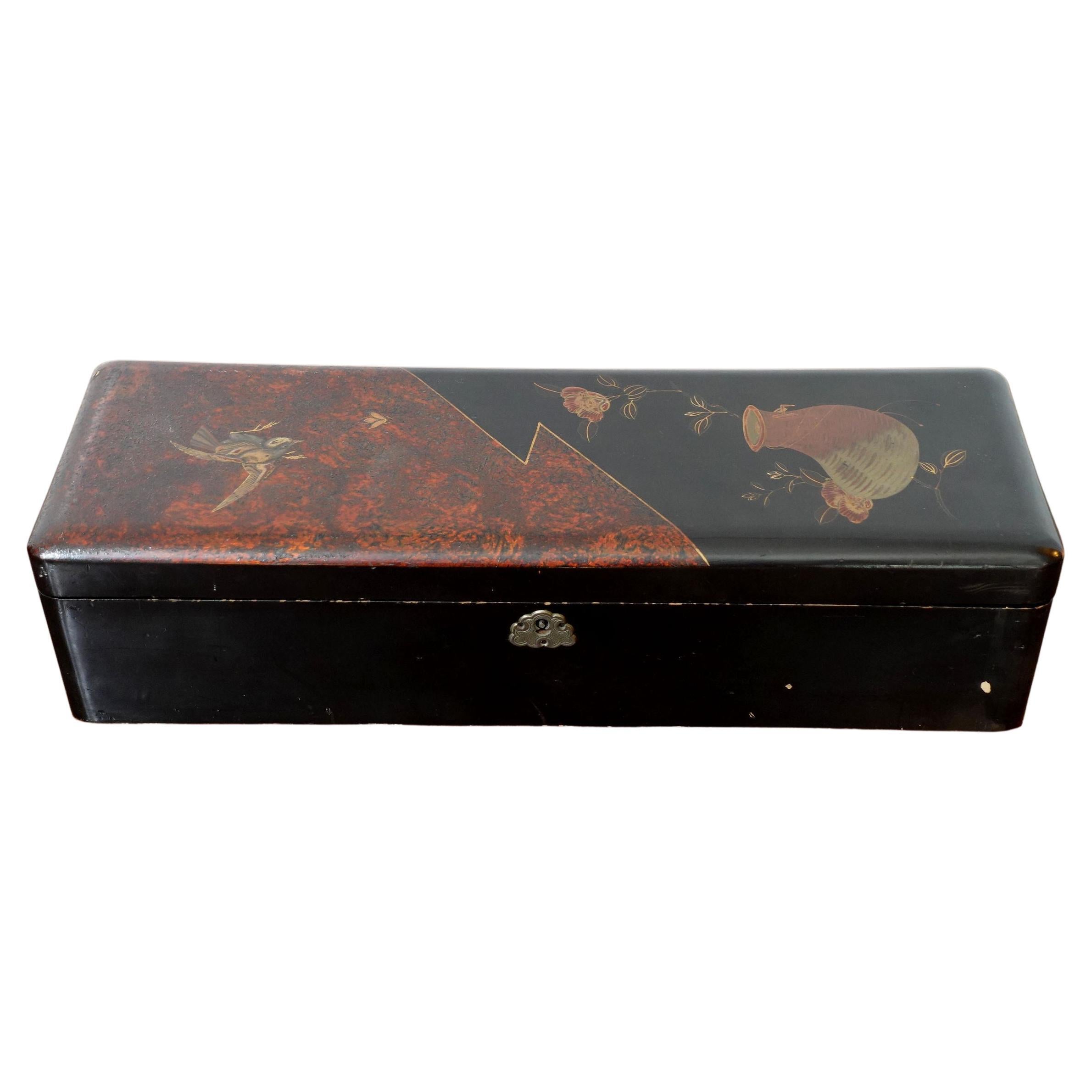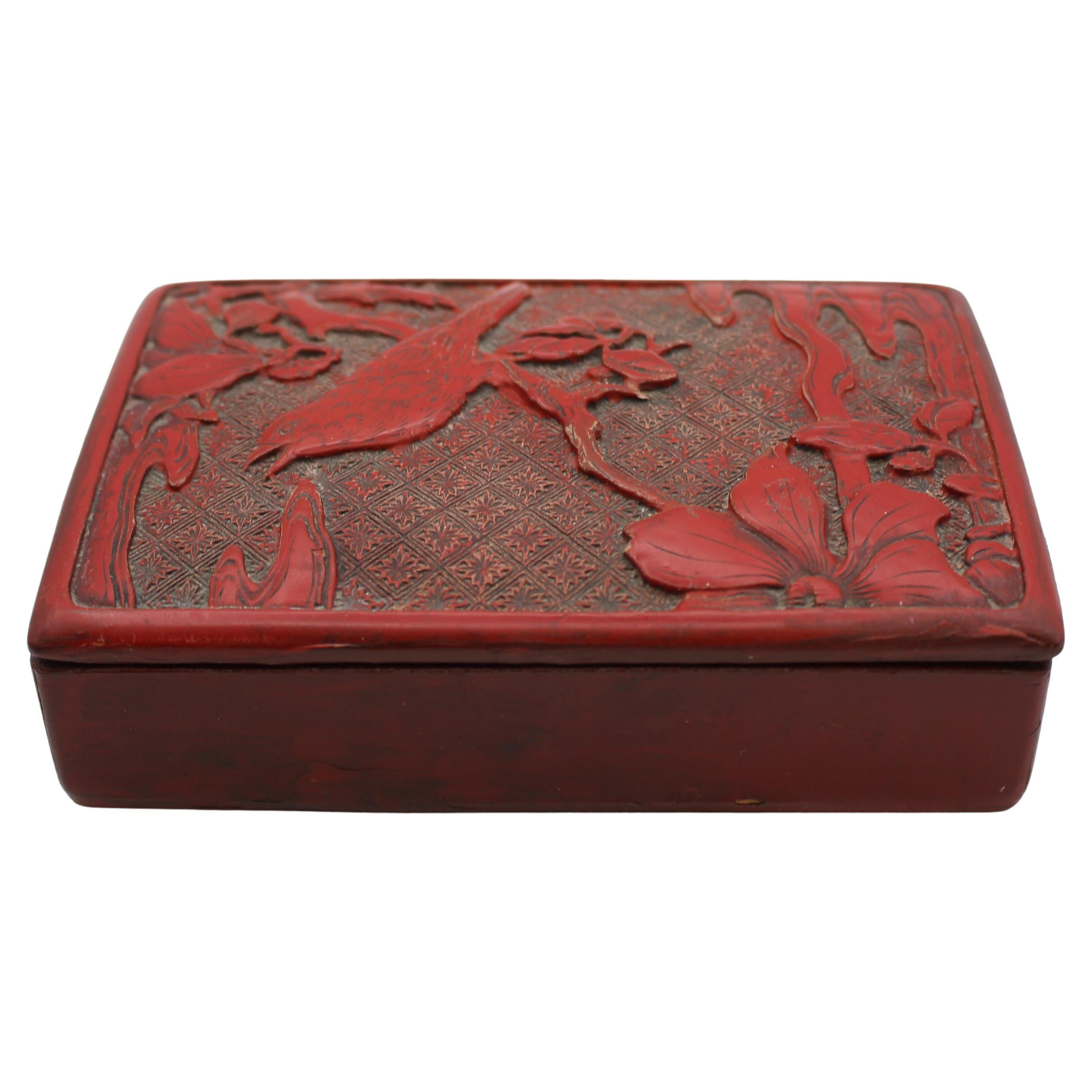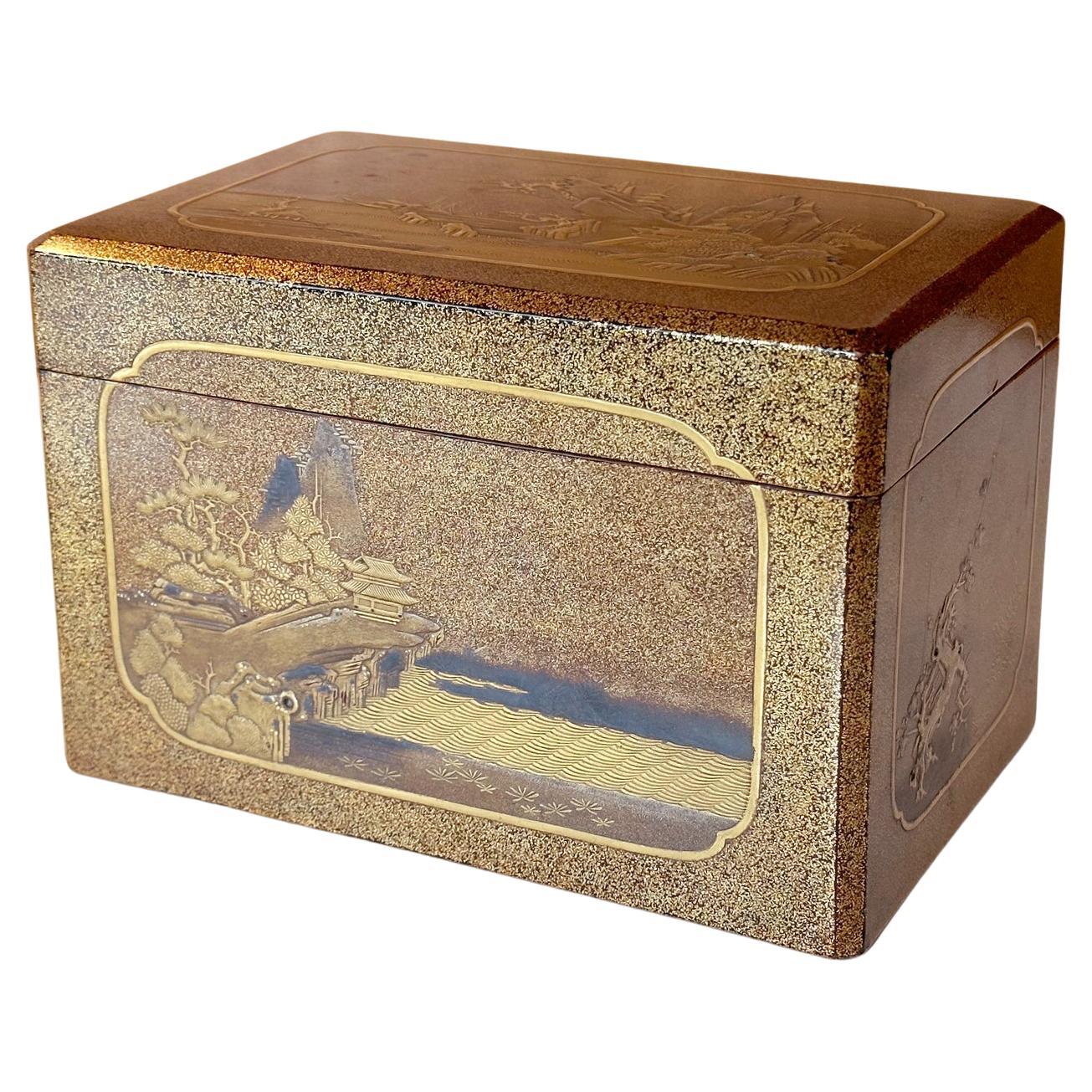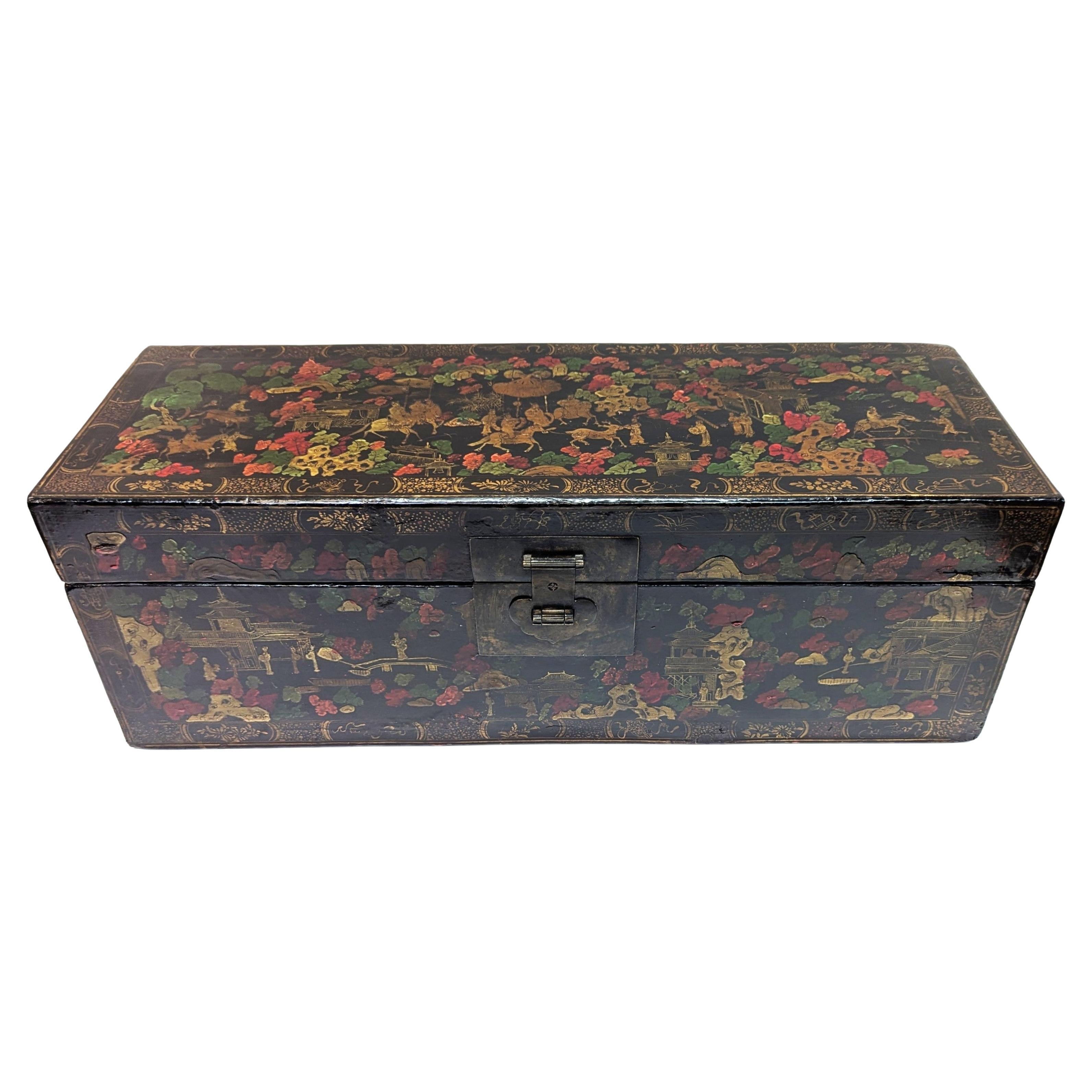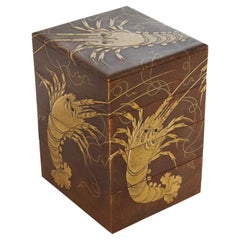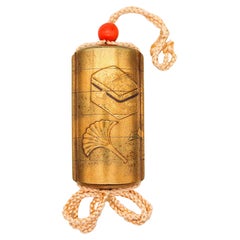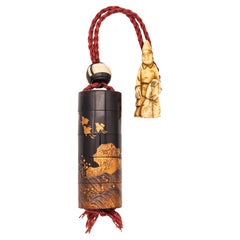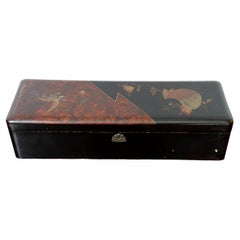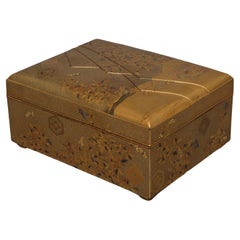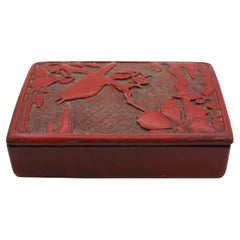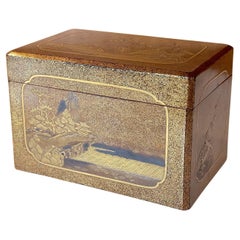Items Similar to JAPAN 1900 Meiji Period Fubako Box In Hiramaki-e Lacquered Wood With Gilding
Want more images or videos?
Request additional images or videos from the seller
1 of 7
JAPAN 1900 Meiji Period Fubako Box In Hiramaki-e Lacquered Wood With Gilding
$1,398
£1,050.22
€1,211.07
CA$1,939.91
A$2,155.67
CHF 1,129.59
MX$26,435.39
NOK 14,407.28
SEK 13,553.84
DKK 9,038.92
Shipping
Retrieving quote...The 1stDibs Promise:
Authenticity Guarantee,
Money-Back Guarantee,
24-Hour Cancellation
About the Item
Fubako letters-box from the Japanese Meiji period (1868-1912).
Beautiful decorative Fubako letters box from the Japanese Imperial Meiji period, circa 1900. This box has been meticulously crafted in wood with lacquer and gilding decorations. Created in an elongated rectangular shape with curved corners, the outside of the lid has decorations in hiramaki-e depicting decorations of Sakura cherry blossom flowers in high relief. The interior part of the lid and the inside of the lower box are fundame lacquered with applications of very fine gold powder.
The Meiji Imperial Period
This is an era of Japanese history that extended from October 23, 1868 to July 30, 1912.The Meiji era was the first half of the Empire of Japan, when the Japanese people moved from being an isolated feudal society at risk of colonization by Western powers to the new paradigm of a modern, industrialized nation state and emergent great power, influenced by Western scientific, technological, philosophical, political, legal, and aesthetic ideas. As a result of such wholesale adoption of radically different ideas, the changes to Japan were profound, and affected its social structure, internal politics, economy, military, and foreign relations. The period corresponded to the reign of Emperor Meiji. It was preceded by the Keiō era and was succeeded by the Taishō era, upon the accession of Emperor Taishō.
Fubako
This is a kind of box. It has been used to store letters, papers, or books, and it is also used to deliver documents to the other party. It is useful not only to store documents or books, but you can also put your favorite small articles or valuables. Or, you can also display it to enjoy as a part of the interior decoration in your room.
Hiramaki-e
This term is in reference to a Japanese lacquer work, gold decoration in low, or “flat,” relief, a basic form of Makie-e. The pattern is first outlined on a sheet of paper with brush and ink. It is then traced on the reverse side of the paper with a mixture of heated wet lacquer and (usually red) pigment. The artist transfers the pattern directly to the desired surface by rubbing with the fingertips, a process called okime. In the next step (jigaki), the pattern that has been transferred is painted over with lacquer—usually a reddish colour. A dusting tube is used to sprinkle gold powder on the painted design while the lacquer is still wet.
Makie-e
This is another more complicated technique of Japanese lacquer art that has been developed uniquely in Japan for about 1200 years. Firstly, it needs to draw a picture with lacquer on the surface with a thin brush. Next, sprinkle the gold powder from above to show the pattern before the lacquer hardens. This technique makes a gorgeous and elegant look to works.
Weight: 385.2 Grams, (0.85 Pounds).
Measurements: 282 mm by 95 mm by 70 mm (11.10 x 3.75 x 2.75 Inches).
Condition: Basically, is in great antique condition, with minimal flea bites at the inside border due the usage, otherwise in great condition. All parts are secured in the settings. This Fubako box has been carefully inspected to guarantee the condition and authenticity.
INVENTORY REF: D032425MNND/.6745
- Dimensions:Height: 2.75 in (6.99 cm)Width: 11.1 in (28.2 cm)Depth: 3.75 in (9.53 cm)
- Style:Meiji (Of the Period)
- Materials and Techniques:
- Place of Origin:
- Period:1900-1909
- Date of Manufacture:1900
- Condition:Wear consistent with age and use. Basically, is in great antique condition, with minimal flea bites at the inside border due the usage, otherwise in great condition. All parts are secured in the settings. This Fubako box has been carefully inspected to guarantee the condition.
- Seller Location:Miami, FL
- Reference Number:Seller: D032425MNND/.67451stDibs: LU8303244639322
About the Seller
5.0
Gold Seller
Premium sellers maintaining a 4.3+ rating and 24-hour response times
1stDibs seller since 2023
206 sales on 1stDibs
Typical response time: 3 hours
- ShippingRetrieving quote...Shipping from: Miami, FL
- Return Policy
Authenticity Guarantee
In the unlikely event there’s an issue with an item’s authenticity, contact us within 1 year for a full refund. DetailsMoney-Back Guarantee
If your item is not as described, is damaged in transit, or does not arrive, contact us within 7 days for a full refund. Details24-Hour Cancellation
You have a 24-hour grace period in which to reconsider your purchase, with no questions asked.Vetted Professional Sellers
Our world-class sellers must adhere to strict standards for service and quality, maintaining the integrity of our listings.Price-Match Guarantee
If you find that a seller listed the same item for a lower price elsewhere, we’ll match it.Trusted Global Delivery
Our best-in-class carrier network provides specialized shipping options worldwide, including custom delivery.More From This Seller
View AllJAPAN 1880 Meiji Period Tebako Box In Red Lacquered Wood With Abalone Inlaid
Located in Miami, FL
Presentation Tebako box from the Japanese Meiji period (1868-1912).
Beautiful decorative presentation Tebako box from the Japanese Imperial Meiji period, circa 1880. This box has been meticulously crafted in a squared cushioned shape in wood with kara coating Kobayashi red lacquer, gilding, black lacquer and inlaid decorations of abalone shell, Raden. Tebako literally means "portable box", it is a toilet box containing the objects necessary for washing and make-up, especially blush mirror...
Category
Antique 1880s Japanese Meiji Lacquer
Materials
Abalone, Wool, Lacquer
JAPAN Meiji Period 1870 Four Tiers Presentation Jubako Box Namiki Lacquer & Gold
Located in Miami, FL
Four Tier Japanese Gilt Jubako Maki-E box with red Interior.
This is a beautiful decorative presentation Jubako box created in the Imperial Japan during the early Meiji period (1868...
Category
Antique 1870s Japanese Meiji Lacquer
Materials
Gold
$4,360 Sale Price / set
20% Off
Japan 1800 Edo Period Six Drawer Inro In Lacquered Gilt Wood With Utensils
Located in Miami, FL
Japanese Inro from the Edo Period (1603-1867).
Beautiful Inro, created in Japan during the Edo period (Shogunate), circa 1800. It was carefully crafted in carved precious wood with ...
Category
Antique Early 1800s Japanese Edo Lacquer
Materials
Coral
$2,600 Sale Price
20% Off
Japan 1870 Meiji Period Round Five Drawer Inro Lacquered Wood With Flying Cranes
Located in Miami, FL
Japanese Inro from the Meiji Period (1868-1912).
Beautiful Inro, created in Japan during the Meiji imperial period, circa 1870. It was carefully crafted in carved precious wood with applications of lacquer and decorated with orientalism patterns. All dan trays are attached together with a himo cord. The detailed craftsmanship was a true pleasure to behold.
Period: Meiji 1868-1912, Period of Emperor Mutsuhito.
Approximate Date: 1870.
Motif: Organic design with cascade landscape scene and five flying cranes.
Drawers: Five.
Shape: Cylinder. Very unusual and rare shape.
Technique: Carved wood, Lacquer, hiramaki-e, takamaki-e, Gilding.
Ojime: 17mm, round with Ebony wood.
Netsuke: Carved dressed...
Category
Antique 1870s Japanese Meiji Lacquer
Materials
Wood, Ebony, Giltwood, Lacquer
$2,388 Sale Price
20% Off
England 1780 Georgian Battersea Enamel Baroque Decorated Box in Gilded Bronze
Located in Miami, FL
Late 18th century Georgian Battersea enamel box.
A beautiful antique English Battersea Bilston table snuff box, created in the district of Bat...
Category
Antique 1780s English George III Snuff Boxes and Tobacco Boxes
Materials
Bronze, Enamel
$2,388 Sale Price
20% Off
NAPOLEON III Paris 1860 Travel Foldable Writing Desk Box In Precious Woods & Aba
By Napoléon III
Located in Miami, FL
An antique Napoleon III traveler portable writing-desk box.
This is a gorgeous portable writing desk-box, created in France during the period of emperor Napoleon III, circa 1860. Th...
Category
Antique 1860s French Napoleon III Decorative Boxes
Materials
Leather, Shell, Wood
You May Also Like
Japanese Maki-e Lacquered Box, Ric.049
Located in Norton, MA
Japan, Edo to Meiji period, a long rectangular document box with hinged cover, decorated with a bird and a floral basket,
The locker is not functioning.
Category
Antique 19th Century Japanese Decorative Boxes
Materials
Lacquer
Exceptional Japanese Gold Lacquer Tebako 手箱 'Box for Personal Accessories'
Located in Amsterdam, NL
Exceptional Japanese rectangular gold lacquer tebako (box for personal accessories) with a slightly domed well-fitted lid and raised by four low bracket feet. The lid finely carved with pointed shapes as if it is covered by folded papers.
On top of this embossed surface it is decorated with gold and silver hiramaki-e (low-relief design) and takamaki-e (high-relief design) depicting a wild winding river landscape with along the waterfront...
Category
Antique 19th Century Japanese Lacquer
Materials
Giltwood, Lacquer
Late 19th Century Japanese Kamakura Carved Lacquer & Wood Box
By The Lacquer Company
Located in Chapel Hill, NC
Late 19th century Japanese Kamakura carved lacquer & wood box. A bird perches in a flowering tree on the top surface. Often mistaken for Chinese carved lacquer. Good overall conditio...
Category
Antique Late 19th Century Japanese Meiji Lacquer
Materials
Wood, Lacquer
Exquisite Japanese Lacquer Maki-e Hand Box Kobako Edo Period
Located in Atlanta, GA
An early Japanese lacquer Maki-e decorated kobako (small storage box) circa 18th century (Edo period). Based on its form and size, this kobako was possibly used as a Chabako to store the accoutrements for chado (tea ceremony). The lidded box is of rectangular form with bevel design on all edge that softens the appearance. The entire surface was densely covered with a background of nashiji. Elaborate Maki-e techniques were used on each side to showcase a distinct landscape or floral design within a cartouche panel. On the surface of the lid, a mountainous landscape rises from the edge of the water. The poetic composition is akin to a traditional ink scroll...
Category
Antique 18th Century Japanese Edo Lacquer
Materials
Lacquer
Antique Chinoisiere Lacquered Box
Located in New York, NY
Chinoiserie Lacquer Box. Beautifully hand painted Chinoiserie Box decorated with auspicious Chinese scenes. The box is constructed of wood having polychrome painting lacquered with...
Category
Early 20th Century Chinese Qing Lacquer
Materials
Bronze
Japanese Edo Period Igarashi School Long Lacquer Box, Tanzaku-Bako
Located in Austin, TX
A stunning Japanese Edo period lacquer tanzakubako, box for poem cards, late 18th-early 19th century, Edo Period, Japan.
Attributed to the Igarashi School, this box is masterfully ...
Category
Antique Early 19th Century Japanese Edo Lacquer
Materials
Mother-of-Pearl, Lacquer
More Ways To Browse
Japanese Wood Crafts
Japan 1900
Antique Wood Furniture Parts
Meiji Wood
Meiji Wood Furniture
Japanese Step
Lacquered Boxes Modern
Emperor Japan
Red Lacquer Box
Japanese Lacquer Boxes
Military Box
Japanese Gilt Wood
Used Harden
Japanese Meiji Period Box
Antique Artist Paint Box
Antique Wood Letters
Antique Powder Boxes
Cherry Wood Box
